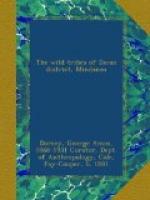In the districts to the west of Cibolan the general belief is that there are but two gimokod, one inhabiting the right side of the body, the other the left. That of the right side is good, while all evil deeds and inclinations come from the one dwelling on the left. It is a common thing when a child is ill to attach a chain bracelet to its right arm and to bid the good spirit not to depart, but to remain and restore the child to health. In Malilla it is believed that after death the spirit of the right side goes to a good place, while the one on the left remains to wander about on earth as a buso,[1] but this latter belief does not seem to be shared by the people of other districts.
[1] See p. 107.
Aside from the gimokod the Bagobo believe that there exists a great company of powerful spirits who make their homes in the sky above, in the space beneath the world, or in the sea, in streams, cliffs, mountains, or trees. The following is the list related by Datu Tongkaling, a number of mabalian, and others supposed to have special knowledge concerning these superior beings.
I. Eugpamolak Manobo, also called Manama and Kalayagan. The first and greatest of the spirits, and the creator of all that is. His home is in the sky from whence he can observe the doings of men. Gifts for him should be white, and should be placed above and in the center of offerings intended for other spirits. He may be addressed by the mabalian, the datu, and wise old men.
II. Tolus ka balakat, “dweller in the balakat[1].” A male spirit who loves the blood, but not the flesh of human beings, and one of the three for whom the yearly sacrifice is made. Only the magani may offer petitions to him. He is not recognized by the people of Digos and vicinity.
[1] A hanger in which offerings are placed.
III and IV. Mandarangan and his wife Darago. This couple look after the fortunes of the warriors, and in return demand the yearly sacrifice of a slave. They are supposed to dwell in the great fissure of Mt. Apo, from which clouds of sulphur fumes are constantly rising. The intentions of this pair are evil, and only the utmost care on the part of the magani can prevent them from causing quarrels and dissentions[sic] among the people, or even actually devouring some of them.
V. Taragomi. A male spirit who owns all food. He is the guardian of the crops and it is for him that the shrine known as parobanian is erected in the center of the rice field.
VI. Tolus ka towangan. The patron of the workers in brass and copper.
VII. Tolus ka gomanan. Patron of the smiths.
VIII. Baitpandi. A female spirit who taught the women to weave, and who now presides over the looms and the weavers.
IX. and X. Toglai, also called Si Niladan and Maniladan, and his wife Toglibon. The first man and woman to live on the earth. They gave to the people their language and customs. After their death they became spirits, and are now responsible for all marriages and births. By some people Toglai is believed to be one of the judges over the shades of the dead, while in Bansalan he is identified with Eugpamolak Manobo.




